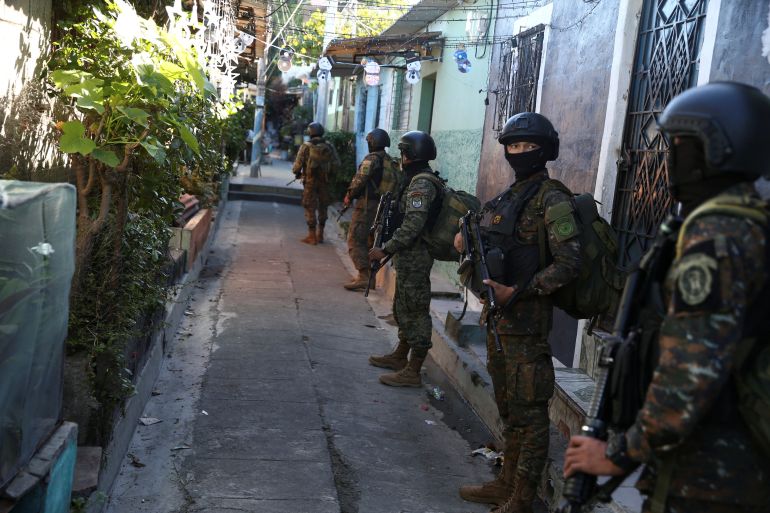El Salvador renews state of emergency as gang crackdown continues
Government says emergency measures have led to drop in murders, but rights groups raise concerns about reported abuses.

El Salvador’s legislature has extended a state of emergency for 30 days as President Nayib Bukele’s administration continues a months-long “war” against criminal gangs that has led to the arrests of tens of thousands of people.
Passed on Wednesday with 67 votes in favour in the country’s 84-seat unicameral Congress, the measure extends “the emergency regime … [to continue] the reestablishment of order, citizen security and territorial control”.
Keep reading
list of 3 itemsEl Salvador has arrested 55,000 as part of ‘war’ on gangs
El Salvador deploys 10,000 troops to gang-run capital suburb
It was the 10th extension of the state of emergency and will come into force from January 17 to February 15 to tackle gangs that Bukele says control approximately 80 percent of the country.
El Salvador first imposed the emergency measures in March of last year after dozens of people were killed in a weekend of mass violence blamed on armed groups.
The Salvadoran president and his supporters have touted the policy as helping to protect citizens and restore order, but rights groups and United Nations experts have raised concerns about the suspension of civil liberties, as well as reports of arbitrary detentions and other abuses.
More than 61,000 people have been detained under the state of emergency, according to official estimates.
“Many arrests appear to have been based on the appearance or social background of the detainees, and local human rights groups have documented that hundreds of people with no connection to gangs have been detained,” Human Rights Watch said in its annual report released on Thursday.
“Human rights organizations … have documented serious abuses by security forces during the state of emergency, including arbitrary arrests, enforced disappearances, torture and other forms of ill-treatment, and due process violations,” the group also said.
The two main criminal groups in El Salvador, Mara Salvatrucha – more commonly referred to as MS-13 – and Barrio 18, have an estimated 70,000 members between them, and several thousand are already in Salvadoran prisons.
In Congress on Wednesday, left-wing deputy Marleni Funes said pro-government legislators “can fight crime without taking innocent people [to jail]”.
Suecy Callejas, vice president of the assembly, said the measures were needed to “save the lives of Salvadorans”.
Earlier this month, the government said murders in El Salvador had dropped 56.8 percent in 2022 compared with the previous year.
Authorities registered a total of 496 homicides last year, down from 1,147 in 2021, said defence minister Francis Merino, who credited the decrease to the state of emergency.
“The reduction in homicides is a result of the state of exception, because that number of criminals is no longer on the streets harming the population,” Merino said.
The tally does not count deaths of gang members killed in encounters with security forces, which would raise the total to 600.